
Hemato
Scope & Guideline
Exploring Breakthroughs in Blood Health
Introduction
Aims and Scopes
- Hematologic Malignancies:
A core area of focus is on hematologic malignancies, including various forms of leukemia, lymphoma, and myeloma. The journal publishes research on their molecular mechanisms, treatment strategies, and clinical outcomes. - Transfusion Medicine:
The journal covers advancements in transfusion medicine, exploring the implications of blood component therapies and their interactions with different treatment modalities, particularly in patients with hematologic disorders. - Innovative Therapies and Technologies:
There is a strong emphasis on innovative therapies, including immunotherapies, CAR-T cell therapies, and targeted therapies. The journal showcases studies that evaluate the efficacy and safety of these novel treatment approaches. - Clinical and Epidemiological Research:
The journal publishes clinical and epidemiological studies that provide insights into the prevalence, risk factors, and outcomes of hematologic diseases, contributing to evidence-based practice. - Patient-Centered Care:
Research on the psychosocial aspects of hematologic diseases, including patient-reported outcomes and quality of life, is also a significant focus, reflecting a commitment to patient-centered care.
Trending and Emerging
- Precision Medicine and Genomics:
There is a growing emphasis on precision medicine and the integration of genomic data into treatment strategies for hematologic diseases, which is crucial for tailoring therapies to individual patient profiles. - Artificial Intelligence and Big Data:
Emerging research on the application of artificial intelligence and big data analytics in hematology is trending, with studies focusing on predictive modeling and improving diagnostic accuracy. - Immunotherapy Developments:
The journal has seen an increase in publications related to immunotherapy, particularly CAR-T cell therapy and checkpoint inhibitors, as these modalities continue to revolutionize treatment paradigms. - Management of Comorbidities in Hematologic Patients:
Research addressing the management of comorbidities, such as cardiovascular issues in patients with hematologic malignancies, is gaining traction, reflecting a holistic approach to patient care. - Global Health Initiatives in Hematology:
There is an emerging focus on global health initiatives and resource-limited settings, particularly studies aimed at improving care for populations with high burdens of hematologic diseases.
Declining or Waning
- Traditional Chemotherapy Approaches:
There is a noticeable decline in publications focused on traditional chemotherapy approaches for hematologic malignancies, as newer targeted therapies and immunotherapies gain prominence. - Historical Epidemiological Studies:
Studies that primarily focus on historical epidemiological data without integrating new findings or technologies are less frequently published, indicating a shift towards more current and actionable research. - Basic Science Research Without Clinical Application:
Basic science studies that do not demonstrate a clear clinical application or relevance to patient care are becoming less common, as the journal increasingly prioritizes translational research.
Similar Journals
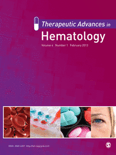
Therapeutic Advances in Hematology
Advancing hematology through innovative research.Therapeutic Advances in Hematology is a prestigious, peer-reviewed journal dedicated to advancing the field of hematology through innovative research and clinical studies. Published by SAGE Publications Ltd, this journal has become a vital resource for hematology professionals and researchers since its inception in 2010. With its impactful Q1 ranking in Hematology and a Scopus rank of 62 out of 137, it firmly establishes itself as a leader in disseminating significant findings and therapeutic approaches. The journal has been committed to open access since 2019, ensuring that its cutting-edge research is readily available to the global scientific community. Covering a broad scope of topics within hematology, Therapeutic Advances in Hematology is an essential platform for those seeking to enhance their understanding and implementation of therapeutic practices in hematological conditions. The journal embraces submissions from both clinical and laboratory perspectives, fostering collaboration and dialogue among researchers, clinicians, and students alike.
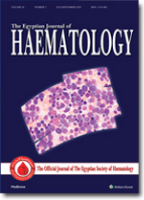
Egyptian Journal of Haematology
Elevating Expertise in Blood Disorders and Transfusion MedicineThe Egyptian Journal of Haematology, published by WOLTERS KLUWER MEDKNOW PUBLICATIONS, stands as a pivotal resource in the field of hematology, particularly within the context of Egypt and the broader Middle Eastern region. This journal is dedicated to disseminating high-quality research that explores the latest advancements in blood disorders, hematologic malignancies, and transfusion medicine. With a focus on original research, case studies, and reviews, it aims to provide a comprehensive platform for hematologists, researchers, and healthcare professionals to enhance their understanding and management of hematological conditions. Although it is not an open-access journal, the rigorous peer-review process ensures that only the most impactful studies are published, contributing to the journal's reputation in the academic community. The Egyptian Journal of Haematology serves as an essential tool for advancing knowledge, improving clinical outcomes, and fostering collaboration among experts in the field.
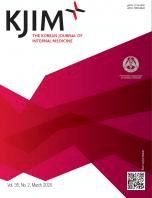
KOREAN JOURNAL OF INTERNAL MEDICINE
Connecting Researchers and Practitioners in Internal MedicineKorean Journal of Internal Medicine, ISSN 1226-3303, E-ISSN 2005-6648, published by the Korean Association of Internal Medicine, stands as a vital resource in the field of internal medicine. Since its inception in 1961 and the shift to open access in 1986, this journal has consistently provided a platform for innovative research and clinical practices, contributing significantly to the advancement of medical knowledge in South Korea and beyond. With an impressive 2023 impact factor and a Q2 quartile ranking among internal medicine journals, it occupies a commendable position in Scopus rankings, holding the #54 slot out of 167 in the category. The journal emphasizes the dissemination of high-quality research findings, clinical reviews, and case reports, making it indispensable for researchers, professionals, and students eager to stay at the forefront of internal medicine. For authors and readers alike, the journal fosters an engaged and informed community, supporting the continuing education and professional development necessary in today's rapidly evolving medical landscape.
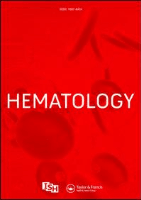
Hematology
Unlocking Potential: Pioneering Research in Blood DisordersHematology is a distinguished open-access journal published by Taylor & Francis Ltd, dedicated to advancing research and knowledge in the field of hematology. Established in 1996, the journal has continually evolved to meet the needs of a growing community of researchers and practitioners, providing a vital platform for disseminating innovative findings and clinical insights. With its impact factor reflecting a robust commitment to quality scholarship, Hematology has achieved a respectable position in its category as evidenced by its Q3 ranking in the Hematology category and ranks #85 out of 137 in the Scopus index, which positions it in the 38th percentile among its peers. The journal’s open-access policy, initiated in 2019, further enhances its reach and accessibility, allowing a broad audience of professionals, researchers, and students to engage with high-quality research without barriers. By covering a wide range of topics related to blood disorders, treatment methodologies, and emerging therapies, Hematology stands as an essential resource for those dedicated to innovation in this critical area of healthcare.

Journal of Hematology
Bridging Knowledge Gaps in HematologyThe Journal of Hematology, published by ELMER PRESS INC, serves as a pivotal platform for disseminating cutting-edge research in the field of hematology. With an ISSN of 1927-1212 and an E-ISSN of 1927-1220, this journal is committed to advancing scientific knowledge and clinical practice through high-quality peer-reviewed articles encompassing all aspects of blood disorders, from basic science to health policy implications. While the journal currently operates under a traditional access model, it nonetheless prioritizes the rapid publication of significant findings, ensuring that researchers, clinicians, and students have timely access to the latest advancements in hematological research. Positioned to bridge gaps in knowledge and foster collaboration among scholars worldwide, the Journal of Hematology is an essential resource for anyone invested in this vital area of medicine.
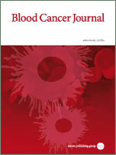
Blood Cancer Journal
Transforming insights into impactful treatments.Blood Cancer Journal, published by SPRINGERNATURE, is a leading open-access journal that has been at the forefront of hematology and oncology research since its inception in 2011. With an impressive impact factor and a commitment to disseminating high-quality research, it holds a prestigious Q1 ranking in both hematology and oncology categories as of 2023. The journal is dedicated to publishing innovative studies, comprehensive reviews, and insightful commentaries that advance our understanding of blood cancers, making it an essential resource for researchers, healthcare professionals, and students in the field. Its open-access model ensures that groundbreaking research is accessible to a global audience, promoting collaborative efforts to enhance treatment methodologies and patient outcomes. With a strong reputation illustrated by its Scopus rankings—8th in hematology and 30th in oncology—Blood Cancer Journal exemplifies excellence and leadership in the ever-evolving landscape of cancer research.
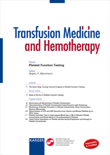
TRANSFUSION MEDICINE AND HEMOTHERAPY
Advancing transfusion science for better patient outcomes.TRANSFUSION MEDICINE AND HEMOTHERAPY, published by KARGER, is a prominent journal dedicated to advancing the fields of hematology and transfusion medicine. With an ISSN of 1660-3796 and E-ISSN 1660-3818, this esteemed journal has been a valuable resource for researchers and clinicians since its inception in 1973, with significant publication phases continuing into 2024. It currently holds a Q2 ranking in Hematology and a Q3 ranking in Immunology and Allergy, reflecting its impact and relevance in these critical fields. The journal features original articles, reviews, and clinical studies, presenting cutting-edge research that aids in the development of effective therapies and enhances patient care. Open access options are available, ensuring that crucial findings are accessible to a broad audience. As an important platform for dialogue and advancement in transfusion science, TRANSFUSION MEDICINE AND HEMOTHERAPY supports the global health community's efforts to improve treatment outcomes and foster innovation in medical practices.
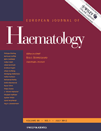
EUROPEAN JOURNAL OF HAEMATOLOGY
Connecting Experts in the Evolving Field of HematologyEUROPEAN JOURNAL OF HAEMATOLOGY, published by Wiley, serves as a vital resource for experts in the field of hematology, focusing on the latest advancements in blood disorders and therapies. With an ISSN of 0902-4441 and an E-ISSN of 1600-0609, this esteemed journal has been disseminating knowledge since 1986 and continues to thrive, converging its visionary approach through to 2024. Notably, it holds a distinguished Q2 ranking in Hematology and an impressive Q1 ranking in the broader category of Medicine (miscellaneous) as of 2023, highlighting its significant contribution to the scientific community. With a Scopus rank of #45/137 and a 67th percentile in the field, the journal is recognized for its rigorous peer-reviewed research, making it an indispensable publication for researchers, practitioners, and students aiming to stay at the forefront of hematological studies. Though not an open-access journal, it ensures broad accessibility to critical findings via its subscription model, thus fostering an informed and globally engaged audience.

Current Hematologic Malignancy Reports
Innovative Insights into Hematologic MalignanciesCurrent Hematologic Malignancy Reports is a significant journal published by the CURRENT MEDICINE GROUP, dedicated to advancing the field of hematology and oncology. With an impressive categorization in the Q1 and Q2 quartiles reflecting its influence and quality—ranked 39th in Medicine Hematology and 129th in Medicine Oncology—it aims to provide a critical platform for the dissemination of innovative research and insights related to hematologic malignancies. Since its inception in 2006, this journal has served as a vital resource for researchers, clinicians, and students alike, fostering collaborative discussions and the exchange of knowledge that can drive improvements in patient care and treatment outcomes. The journal is not currently open-access, ensuring a curated selection of high-quality articles that are peer-reviewed for the enrichment of its readership. The address for correspondence is 400 Market Street, Ste 700, Philadelphia, PA 19106, United States. Its robust impact within the community is showcased through its competitive Scopus rankings, further establishing its importance in ongoing scientific discourse.

HemaSphere
Connecting researchers, clinicians, and students in hematology.HemaSphere, published by WILEY, stands at the forefront of hematology research, offering a vital platform for the dissemination of cutting-edge findings in the field. Since its inception in 2017 and official transition to Open Access in 2018, the journal has positioned itself as a leading conduit for high-impact research, maintaining a prestigious Q1 quartile ranking in the Hematology category as of 2023. Addressed in the United States at 111 River St, Hoboken, NJ, HemaSphere aims to foster a global dialogue among researchers, clinicians, and students by providing unrestricted access to high-quality content that encompasses clinical and experimental advancements. With an array of engaging articles, reviews, and commentaries, HemaSphere contributes significantly to the advancement of hematology, ensuring that critical knowledge is readily accessible to enhance patient care and innovative research. To explore the latest developments and breakthroughs in this dynamic field, we invite scholars, professionals, and students to engage with HemaSphere and elevate their understanding of hematologic science.